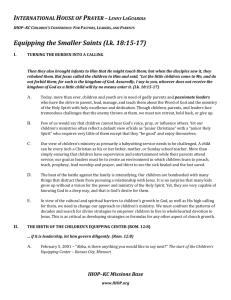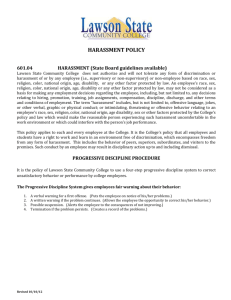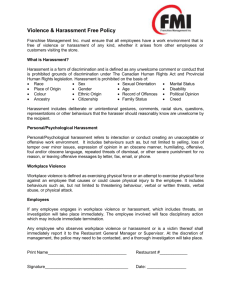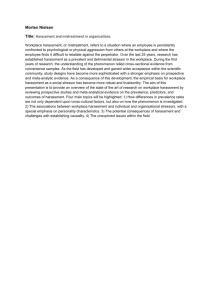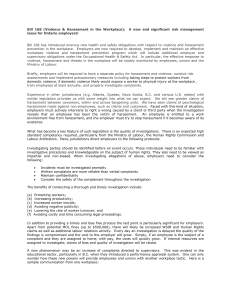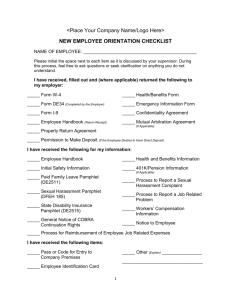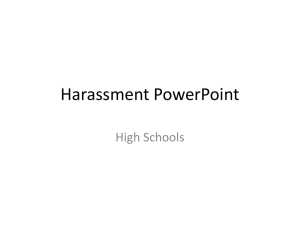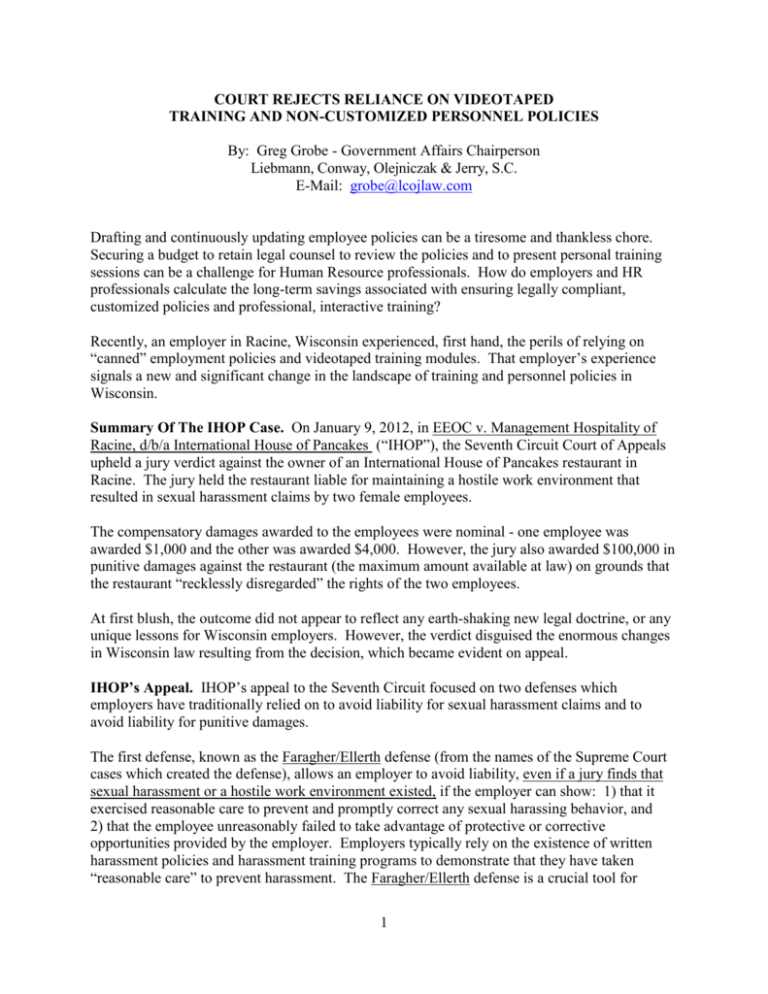
COURT REJECTS RELIANCE ON VIDEOTAPED
TRAINING AND NON-CUSTOMIZED PERSONNEL POLICIES
By: Greg Grobe - Government Affairs Chairperson
Liebmann, Conway, Olejniczak & Jerry, S.C.
E-Mail: grobe@lcojlaw.com
Drafting and continuously updating employee policies can be a tiresome and thankless chore.
Securing a budget to retain legal counsel to review the policies and to present personal training
sessions can be a challenge for Human Resource professionals. How do employers and HR
professionals calculate the long-term savings associated with ensuring legally compliant,
customized policies and professional, interactive training?
Recently, an employer in Racine, Wisconsin experienced, first hand, the perils of relying on
“canned” employment policies and videotaped training modules. That employer’s experience
signals a new and significant change in the landscape of training and personnel policies in
Wisconsin.
Summary Of The IHOP Case. On January 9, 2012, in EEOC v. Management Hospitality of
Racine, d/b/a International House of Pancakes (“IHOP”), the Seventh Circuit Court of Appeals
upheld a jury verdict against the owner of an International House of Pancakes restaurant in
Racine. The jury held the restaurant liable for maintaining a hostile work environment that
resulted in sexual harassment claims by two female employees.
The compensatory damages awarded to the employees were nominal - one employee was
awarded $1,000 and the other was awarded $4,000. However, the jury also awarded $100,000 in
punitive damages against the restaurant (the maximum amount available at law) on grounds that
the restaurant “recklessly disregarded” the rights of the two employees.
At first blush, the outcome did not appear to reflect any earth-shaking new legal doctrine, or any
unique lessons for Wisconsin employers. However, the verdict disguised the enormous changes
in Wisconsin law resulting from the decision, which became evident on appeal.
IHOP’s Appeal. IHOP’s appeal to the Seventh Circuit focused on two defenses which
employers have traditionally relied on to avoid liability for sexual harassment claims and to
avoid liability for punitive damages.
The first defense, known as the Faragher/Ellerth defense (from the names of the Supreme Court
cases which created the defense), allows an employer to avoid liability, even if a jury finds that
sexual harassment or a hostile work environment existed, if the employer can show: 1) that it
exercised reasonable care to prevent and promptly correct any sexual harassing behavior, and
2) that the employee unreasonably failed to take advantage of protective or corrective
opportunities provided by the employer. Employers typically rely on the existence of written
harassment policies and harassment training programs to demonstrate that they have taken
“reasonable care” to prevent harassment. The Faragher/Ellerth defense is a crucial tool for
1
employers to reduce their exposure to discrimination and harassment claims, which is why most
Wisconsin employers have adopted written harassment policies and routinely present harassment
training.
The second defense, known as the Kolstad defense (from the Supreme Court case which created
the defense), allows an employer to avoid an award of punitive damages, even if sexual
harassment is proven, and even if a compensatory damage award is made, if it can show that it
engaged in “good-faith efforts to implement an anti-discrimination policy.” Like the
Faragher/Ellerth defense, the Kolstad defense is a crucial tool available to Wisconsin employers
to minimize their potential exposures. As with the Faragher/Ellerth defense, employers generally
qualify for protection by adopting a written anti-harassment policy and providing harassment
training.
IHOP claimed, on appeal, that it satisfied both the Faragher/Ellerth defense and the Kolstad
defense because it had adopted and disseminated written harassment policies and because it
provided harassment training to all of its employees. In a shocking decision, the Seventh Circuit
rejected both defenses.
Court Rejects IHOP’s Policies Because They Were Not Customized. IHOP first pointed out
that it maintained a written anti-harassment policy with commonly-accepted language and
complaint procedures. The policy contained standard language indicating that the company had
“zero tolerance” toward sexual harassment, “regardless of whether it is verbal, physical or visual
harassment.” Every employee and manager was provided a policy at the start of employment,
and signed a written acknowledgement form confirming that they read and understood the
policy.
IHOP further pointed out that its policies, in addition to containing standard provisions, were
effective. The female employees obviously understood from the policies that the harassment
they were suffering was improper, because they complained about it, and the complaint
procedures were effective because the company took action to investigate. As part of the
investigation, the restaurant accepted the resignation of the night supervisor who was accused of
perpetrating the harassment and terminated the general manager for allowing the hostile work
environment to occur.
Despite this evidence, the Court rejected IHOP’s defense. The Court declared that IHOP’s
harassment policy was ineffective because it was not specifically tailored to the IHOP
restaurant’s actual practices and not specifically tailored to its employees. The Court noted that
the complaint procedures were confusing and did not identify a specific “point person” to whom
employees were to bring their complaints. Despite the “zero tolerance” language, in practice
supervisors appeared to routinely minimize or ignore complaints of inappropriate behavior,
suggesting that the policy did not accurately reflect the employer’s actual practice. Although the
restaurant investigated the complaints, it only did so after multiple complaints were received,
which allowed the hostile work environment to continue long after it should have ended. Again,
the delay contradicted the language in the policies which indicated that a “prompt” investigation
would occur upon any complaint.
2
In addition, the less-than-clear language was exacerbated by the fact that the IHOP restaurant
employed many teenage employees who could be expected to have difficulty understanding
some of the concepts within the policy (the two females who sued the restaurant were both
teenagers). The policy also contained an overly-strong warning that “deliberately false”
harassment accusations would be dealt with strictly, which could suggest to the young workforce
that complaints were discouraged. In addition, the Court criticized IHOP’s practice of storing
the policies with the signed acknowledgement forms in its corporate files - instead of ensuring
that each employee retained a written copy of the policy.
Court Rejects IHOP’s Use Of Videotaped Training. IHOP also demonstrated that all of its
employees, including managers, were required to watch a videotaped sexual harassment training
session and were required to sign an acknowledgement form that they had seen the video
training. IHOP argued that the training was effective because the female employees recognized
the harassment as inappropriate and properly complained, and because their complaints were
investigated and proper actions taken.
The Seventh Circuit rejected IHOP’s reliance on the videotaped training and upheld the jury’s
conclusion that IHOP “recklessly disregarded” the employees’ protected rights by virtue of
insufficient training and policies.
The Court noted that IHOP’s reliance on videotaped training did not provide the participants
with opportunity for interactive dialog with a professional trainer. Once again, this might have
been particularly important for young employees and inexperienced managers.
The Court was also critical of the fact that managers only attended the same videotaped training
as the employees. No specialized training on the requirements and expectations of supervisory
status was provided.
Once again, the Court noted that the proof of the insufficiency of the training was borne out in
the delayed investigation and failure of the employer to comply with its own policies.
Adding Insult To Injury. The District Court did not stop after imposing punitive damages
against the IHOP restaurant. It ordered the franchisor to publicly post a copy of the jury award
(including the award of punitive damages) at all 17 of its other locations. The company objected
to the unusual Order, on the grounds that the harassment only occurred at a single restaurant and
on grounds that posting the verdict would result in irreparable harm to its business. The
company argued that such a result would be a miscarriage of justice, particularly given the fact
that the compensatory damage award only totaled $4,000. The Court rejected the restaurant’s
arguments, then held it in contempt and imposed a $1,000 per day fine for each day that it failed
to post the notice.
IHOP’s Impact On Wisconsin Employers/Lessons From The Case. Wisconsin employers
should be extremely concerned with the impact of the IHOP decision. Employers routinely use
videotapes, webinars, or other pre-recorded harassment training as a means to reduce the cost of
personalized training and to ensure that employees can immediately receive training at the time
of hire.
3
Likewise, employers routinely rely on “packaged” personnel policies, often purchased from
national vendors, copied from other employers, or downloaded from the internet. Employers
often side-step outside legal reviews of their policies and neglect to perform periodic updating of
their policies. Some employers are wary of frequent policy modifications, which can be time
consuming and possibly lead to the perception that the superseded policies were unlawful.
Others simply assume that if their overall treatment of employees is “fair” and professional, the
language of the policies is less important.
The IHOP decision is a clear warning that relying on these traditional practices can be risky. The
Seventh Circuit is certainly declaring that policies must be carefully crafted and must be
effective in practice. The decision requires that training consist of more than a short period of
time spent in front of a computer or television screen, and that employers take steps to ensure
that the training is effective. In particular, the decision demands that supervisors receive
enhanced, personalized training to ensure that proper policies are properly enforced.
Though it may have saved money in the short term by relying on standardized policies and
canned training videos, IHOP ultimately paid a significant price. In some respects, it was
actually fortunate. The compensatory damage award was very low, whereas many harassment
cases result in much higher awards for emotional distress, back pay and benefits and front pay
and benefits. It would not have been surprising in most circumstances for this award to be in the
high six figures or even seven figures if multiple employees were involved. Still, the IHOP
decision certainly can assist employers in calculating the cost of failing to adopt and maintain
legally compliant, customized policies and professional, interactive training.
HR professionals should consider the following steps in light of the IHOP decision:
Harassment policies must be clear and specifically tailored to the business and to the
makeup of the workforce. Employers should budget periodic review of handbooks and
policies by professionals.
Employers must ensure that employees have immediate access to personnel policies.
Distribution of written policies is preferable. However, if electronic policies are used, the
employer must ensure that every employee covered by the policy has immediate and easy
access to the electronic policies at all times and working knowledge on how to gain
immediate access.
While the Court did not specifically hold that videotaped training programs are per se
inadequate, it is clear that relying solely on non-interactive training is insufficient. If
videotaped training is used, then it should be accompanied by interactive communication
with a professional trainer, either as part of the training or as a follow-up.
Employers must ensure that supervisors receive enhanced, specialized, interactive
training on their duties as supervisors.
Employers must audit their actual practices to ensure that practices mirror their policies
and their training.
4
A final lesson from the IHOP case - once a claim is filed, it is too late to update your policies,
training and practices. HR professionals should heed the warnings of the Seventh Circuit and
map out a solid plan to comply with the lessons of IHOP.
Further information on the IHOP case, the Faragher/Ellerth and Kolstad defenses, or other
information in this article may be obtained from the author.
1206700-2
5

